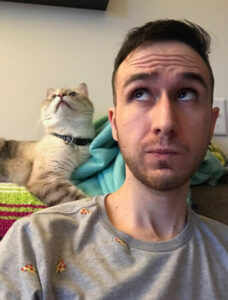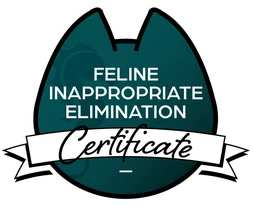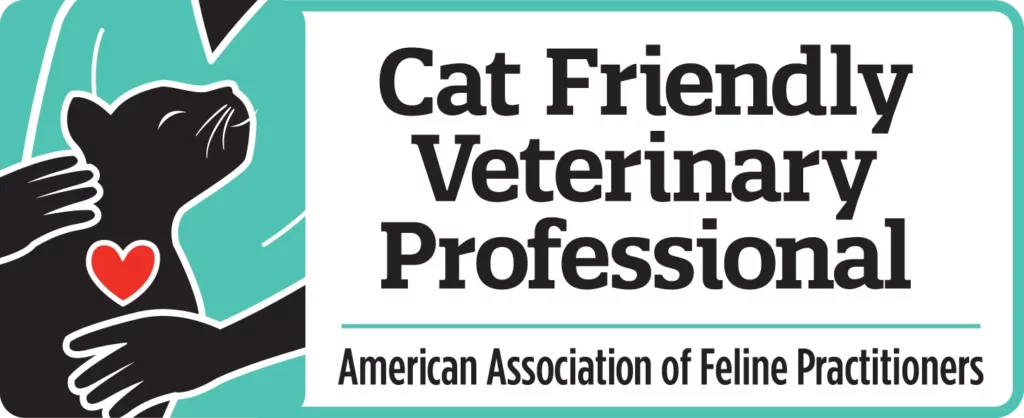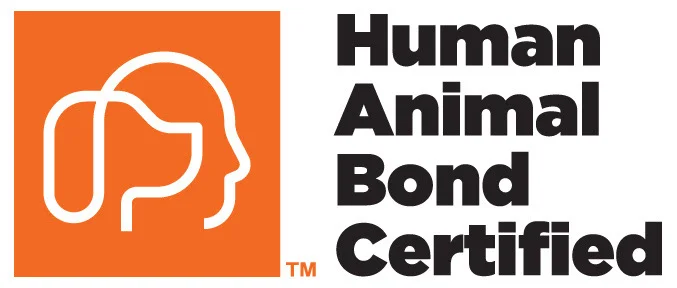This blog is part of a series as I process my grief over the loss of my cat, Zoloft, in the hope of helping others process their grief. I am sharing a new blog post every month for the first year on different topics related to grieving a pet. While my focus is on cats, the advice is applicable to dogs, birds, or any other pet you love. While most of the series is on topics related to grieving after your cat has passed, this one is a bit of an outlier as it’s for people whose cats are still here.
I remember when Zoloft was diagnosed with bladder cancer. They thought he may have had a polyp as we had done an ultrasound a few months prior and didn’t see anything, but he had continued to have blood in his urine despite trying to address potential causes. I remember the call from his vet where she said, “We found a tumor.” After that, things go in and out and the memory is a bit fuzzy. Needless to say, I did not react particularly well.
While I knew he wouldn’t be around forever, especially as I adopted him when he was 8 and cats’ lifespans average around 15 years, suddenly there was a very serious illness that could (and would) eventually lead to him being taken from me. I cried daily for almost a full month afterward as I navigated choices of treatments and processing what was happening.
As bladder cancer in cats is unlikely to be cured, I had to gradually accept the reality of the situation: my best friend was dying. I began going through a wide range of emotions and it almost felt like I was grieving already despite him still being alive. It felt odd to grieve while my cat was still alive, but it was all I could think about. Worst of all, I felt really isolated as I still had my cat. What did I have to grieve?
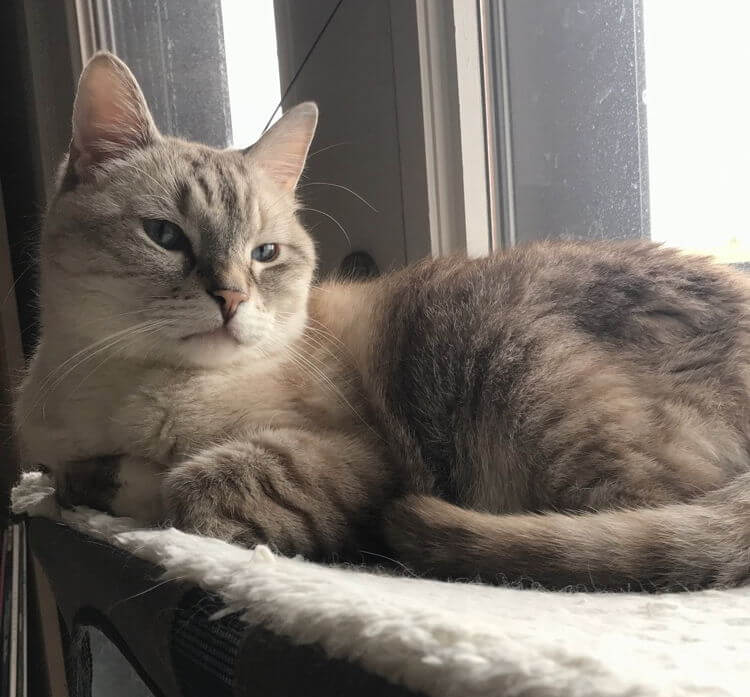
Grieving Can Start Early
Turns out, my experience wasn’t unusual for people whose pets are diagnosed with a serious, life threatening, or terminal illness. It was hard to put a label on exactly what I was experiencing until I stumbled upon the term anticipatory grief. The name is somewhat self explanatory, but it’s a type of grief that occurs when you know an ending is coming, but it hasn’t happened quite yet. While it could apply to other types of pet loss such as an impending rehoming of your cat, I’m focusing on anticipatory grief in the context of a life threatening or terminal illness.
Depending on how much “regular” grief you’ve lived through, you may find anticipatory grief to be extra challenging as you may not be sure how to navigate it. There are so many things to consider in addition to the pending loss of your best friend. What do you need to do to prepare? What keepsakes will you want to keep from them? Will you be able to make their remaining time meaningful and comfortable? Will you have to decide to euthanize your cat? (This doesn’t even begin to touch on the extra complicated emotions that come with behavioral euthanasia)
I found that last one in particular to be challenging. Even though I logically knew that if Zoloft was suffering and there wasn’t anything that could be done I didn’t want him to be in pain, I also really didn’t want to make the choice to euthanize my best friend. There was a time where I even felt like I was actively dangerous to him because I may have to decide when it was time for his life to end eventually even though I wasn’t actively deciding to do it. Anticipatory grief can do some wild things.
What Happens During Anticipatory Grief?
While not everyone may have the exact same bizarre feelings that I did, there are some common emotions you may have if you’re experiencing anticipatory grief for your cat. These include:
- Rehearsing or mentally preparing for your cat’s death, euthanasia, or what will happen after they pass
- Changes in sleep patterns or feeling tired
- Fixation on your cat, their health/diagnosis, or your time together
- Rapidly fluctuating emotions including anger, anxiety, or sadness
- Difficulty focusing
- Fluctuations between hopefulness that your cat’s condition may change and despair
- Periods of time where you feel closer to normal or even at peace with the impending loss
- Guilt over missing something, past interactions with your cat, or rumination on how things may have gone differently
- Guilt over how guilty you feel (anticipatory grief can do some wild things)
I went through every single one of these and then some. I would regularly think about what things I wanted to say as Zoloft passed and how I wanted it to end for him so he could have the most peaceful last few moments of his precious life as he could should I need to go the euthanasia route. While he ended up passing on his own and not at home like I had hoped, I spent a lot of time thinking and preparing for as much as I could in the months leading up to his passing. It was exhausting.
What Is Different Between Anticipatory Grief And Regular Grief?
If you look up symptoms of traditional grieving that occurs after a loss, you’ll notice that there’s a lot of overlap between what people experience with anticipatory grief. Some of them may be variations on a theme, but they’re usually close.
That said, many people find that anticipatory grief is worse than the grief following the death of their cat. The constant change, the constant not knowing what is going to happen next, and the possibility that your best friend is suffering are all a lot to handle. Grief after a cat’s death comes with less uncertainty than trying to figure out what the remainder of your cat’s life will be like and when will be the last time you spend time with them. Will today be their last good day? If I go somewhere, will they be there when I return? It’s tiring.
Combine anticipatory grief with disenfranchised grief, grief that is not accepted by society or seen as less grief as pet loss often is and you have an extra unpleasant combination. While I didn’t find much on the disenfranchised anticipatory grief, I don’t think it’s a stretch to say that anticipatory grief for a loss that typically results in disenfranchised grief like pet does does probably combines the worst aspects of both.
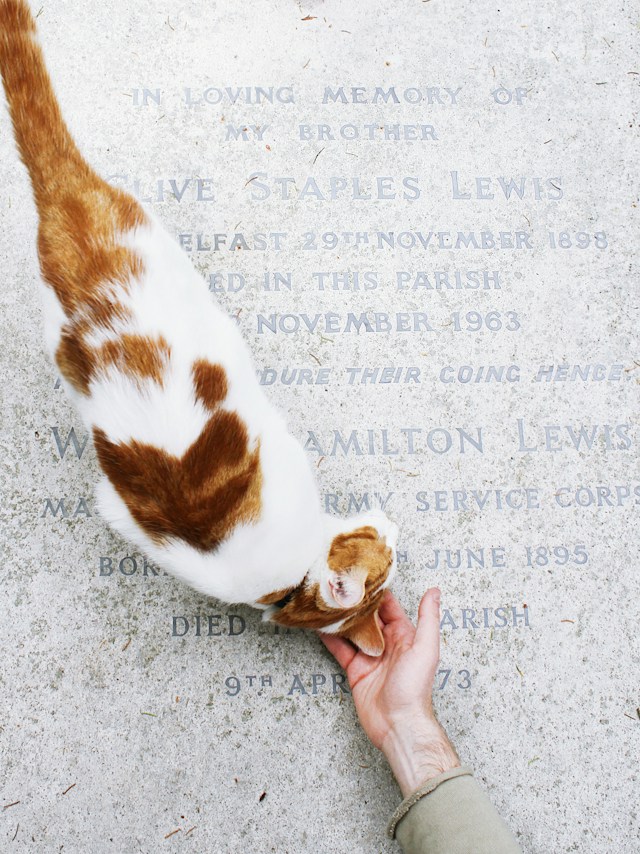
Having gone through anticipatory grief and now living through traditional grief, I can tell you’re they’re both awful in different ways and for different reasons. While knowing that Zoloft was sick and not being sure how much time was left was pretty terrible, Zoloft was still here with me. I still had him around. Every moment with him was special even when I was frustrated with him. I got to still pet him, make him purr, and tell him all the things I wanted to say.
Now, I don’t have that. I know he’s not currently in pain and I don’t have questions about what’s to come, but the trade off is that he’s not here. I have pictures, mementos, and memories, but he’s not here.
They’re different experiences. Neither one is great. I’d argue that rather than saying one is worse than the other that they’re just different flavors of miserable.
How Can I Get Through Anticipatory Grief?
Chances are you’ve found your way here because you’re going through anticipatory grief yourself. While we all know when we adopt a cat that we’ll one day have to say goodbye to them, there’s something about that reality being shoved in our faces that knocks the metaphorical wind out of you. So how can you get through the remaining time until your anticipatory grief turns to regular grief?
Get Support
First, resist the urge to isolate. Social connections are helpful when grieving. As much as grief can make us want to withdraw, you miss out on this important source of support by isolating. That doesn’t mean that you need to say yes to every social invite you receive or there’s something wrong with occasionally saying no to something you just don’t have the capacity for, but you shouldn’t say no to all of them either.
Depending on the care needs of your cat, you may need to stick around home more so don’t be afraid to invite people over or ask someone for help so you can get out. There is a way to spend more time with your cat while not missing out on the humans in your life.
Regardless of how low you’re feeling, there’s no harm in getting connected with a therapist or counselor who specializes in grief or pet loss. They can help you work through the emotions you’re experiencing in a healthy way. If you prefer a group with others who are also experiencing anticipatory grief, Lap of Love offers a virtual anticipatory grief group.
Practice Self Care
No, I’m not suggest you take bubble baths or get a daily massage. While that could be part of self care, the kind of self care I’m referring to is the less sexy kind of self care that is often overlooked.
Go to bed on time and get enough sleep. Keep your regular medical and dental appointments. Exercise and shower especially after exercising. Eat a vegetable. Maybe even eat two vegetables. Basic things that you should probably be doing anyway become extra important now.
It may also mean getting some extra help if you need it. Maybe you splurge and hire someone to help with the cleaning once or every few weeks. Get your groceries delivered rather than going to the grocery store. Turn up your furnace 1 or 2 extra degrees if it helps you feel better. If you’re looking to really splurge, a heated blanket is a great purchase that helped me when I really needed some extra coziness in my life.
Whatever you need within reason (be careful about turning to substances, online shopping, or other things that may have some nasty downsides), allow yourself to do it. You can’t enjoy your remaining time with your cat if you are too unwell to function.
Enjoy Your Time With Your Cat
This was the thing I found most helpful for getting through the anticipatory grief. I enjoyed the hell out of my time with Zoloft. For what ended up being his last Christmas, which happened a few days after he was diagnosed with cancer, I went to Petsmart and bought ALL the toys. Okay, not all of them, but I got him a lot of different toys and treats. I made sure to plan special things for every holiday and that he got plenty of things he enjoyed over the following months.
Really though, Zoloft mostly just wanted to spend time with me. He got lots of snuggles, pets, and time together with me. Chances are, your cat will enjoy being around you. Cherish it because the one benefit of anticipatory grief is that you can still do things with your cat. You still have time.
If you feel inclined, create a bucket list of things you want to do with your cat or things you want to do before they pass. Say everything you want to so they hear it. Don’t wait even if you have plenty of time remaining as you never know.
One suggestion from a cat behavior expert’s standpoint: I make it no secret that I don’t think using squirt bottles on cats is a good thing for many reasons including the amount of stress and fear they can cause cats. If you want to make your cat’s time remaining time comfortable, please put the squirt bottle away. Same goes with any shock mats, motion activated air canisters, and anything else that may cause them pain or fear. The gift of a fear free end of their life is one of the most loving choices you can make.
Create Lasting Mementos
Two additional suggestions from my experience to help you prepare for life after your cat passes: get their paw print. I have a few paw print Christmas ornaments from years our time together and I am so glad I made them. You can find kits to get your cat’s paw print or you can use a one way ink pad to get their paw print on any surface you want. When I got Zoloft back after he passed, they included two ink paw prints along with a clay one. He vet also got two paw prints.I am so glad I have them because I miss his cute little toe beans.
While you probably have plenty of photos of your cat, take more of photos and videos of your cat. I’m not naturally someone who takes a lot of video so I don’t have a ton of video of Zoloft, but I have a few where he is purring and meowing. They are so precious and I wish I had taken more. If there is anything your cat does that you particularly love or any cute noises they make, get them on video when you can. All the photos I took are now such a treasure and helped when I made his memorial scrapbook.
… But Also Take Time Away
My last suggestion may seem counter intuitive so hear me out.
Taking care of a sick pet can be tiring. Even if your cat doesn’t have a ton of care needs, being around them may be a painful reminder that their life is coming to an end. It can be a drain on you and can exacerbate underlying feelings of depression or anxiety.
It’s okay and probably a good idea to spend some time away from your cat. I’m not saying go on a month long vacation or leave for the night when your cat is at the very end, but as precious as that time with them is, it will be tainted by stress and feelings of being overwhelmed if you’re not in a good place.
Have someone come spend time with them so they’re not alone and have them call you if anything seems off. You don’t have to be gone long, but go out to dinner, go spend time with a friend, or even just go for a walk. The occasional time away will allow you to come back and take better care of your cat. Your mood affects your cat’s wellbeing, too. You’ll also enjoy the time more because of the break.
Alternatively, consider having someone come over and help you with the care of your cat while you’re there. Maybe they help with medicating your cat, scooping the litter box, or something else that needs to be done. Even just that break from a few tasks one in a while can help you focus on enjoying their sweet purrs. You don’t know how many you’ll have left and once they’re gone, you’ll miss them more than anything in the world.
Check Out The Other Posts In The Series
For the first year after Zoloft’s passing, I’ll be adding to this series every month. Check out the posts that are published so far along with a few extra posts about cat loss and building memories while your cat is still here.
- Grieving A Cat: Surviving The Loss Of A Special Friend
- Memorializing Your Cat: Making A Special Memory Book Of Your Happiest Memories
- Surviving The Holidays Without Your Cat
- When Should You Adopt A New Cat After Yours Dies?
- What Do I Do With My Cat’s Stuff After They Die?
- How To Support Someone After Their Cat Dies
- Holding A Memorial Service For Your Cat
- The Importance Of Social Connections In Pet Loss
- Sharing Your Cat’s Story As A Way To Heal

